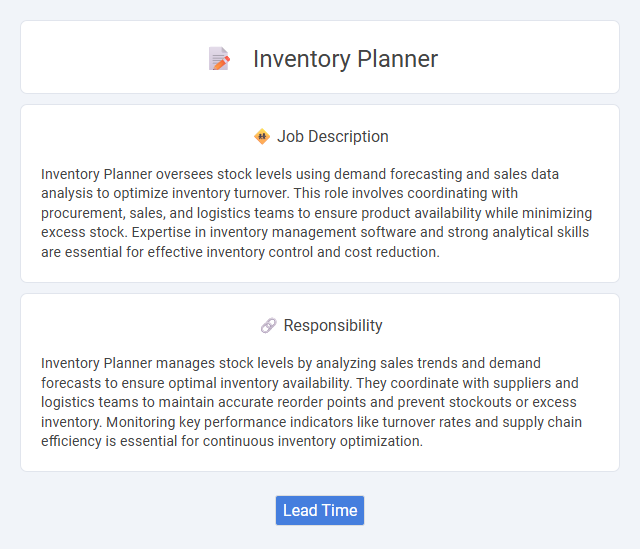
Inventory Planner oversees stock levels using demand forecasting and sales data analysis to optimize inventory turnover. This role involves coordinating with procurement, sales, and logistics teams to ensure product availability while minimizing excess stock. Expertise in inventory management software and strong analytical skills are essential for effective inventory control and cost reduction.
Individuals with strong analytical skills and attention to detail are likely to be suitable for an Inventory Planner role, as the job requires accurate forecasting and inventory management. Those who handle pressure well and possess effective communication skills may increase their probability of success, given the need to coordinate with various departments. Candidates lacking organizational abilities or comfort with data analysis might face challenges in performing optimally in this position.
Qualification
Inventory Planner roles require strong analytical skills and experience with demand forecasting tools, such as SAP APO or Oracle Demantra. Candidates must demonstrate proficiency in inventory management software and excel at optimizing stock levels to minimize costs and avoid stockouts. A background in supply chain management or logistics, coupled with excellent communication skills for cross-functional collaboration, is essential.
Responsibility
Inventory Planner manages stock levels by analyzing sales trends and demand forecasts to ensure optimal inventory availability. They coordinate with suppliers and logistics teams to maintain accurate reorder points and prevent stockouts or excess inventory. Monitoring key performance indicators like turnover rates and supply chain efficiency is essential for continuous inventory optimization.
Benefit
Inventory Planner roles likely offer significant benefits such as improved supply chain efficiency and reduced stockouts, enhancing overall business performance. This position probably enables companies to optimize inventory levels, leading to cost savings and increased profitability. Employees in this role may gain valuable experience in demand forecasting and data analysis, boosting career growth opportunities.
Challenge
Inventory Planner roles may involve significant challenges due to fluctuating demand patterns and supply chain uncertainties, requiring strong analytical skills to forecast accurately. The need to balance inventory levels to minimize stockouts and overstock situations often creates pressure to optimize resources effectively. Adapting to market changes and collaborating with multiple departments could also present ongoing difficulties in maintaining seamless inventory flow.
Career Advancement
Inventory Planner roles demand expertise in demand forecasting, stock optimization, and supply chain coordination to ensure efficient inventory management. Mastery of data analytics and ERP systems paves the way for career progression into senior supply chain analyst, inventory control manager, or operations director positions. Continuous skill development in inventory optimization strategies and technology adoption significantly enhances advancement opportunities in retail, manufacturing, and logistics sectors.
Key Terms
Lead Time
Inventory Planner roles demand precise management of lead time to optimize stock levels and meet demand without overstocking. Accurate forecasting of supplier lead times directly impacts reorder points and safety stock calculations, reducing the risk of stockouts or excess inventory. Expertise in analyzing historical data and coordinating with suppliers ensures timely replenishment and smooth supply chain operations.
 kuljobs.com
kuljobs.com